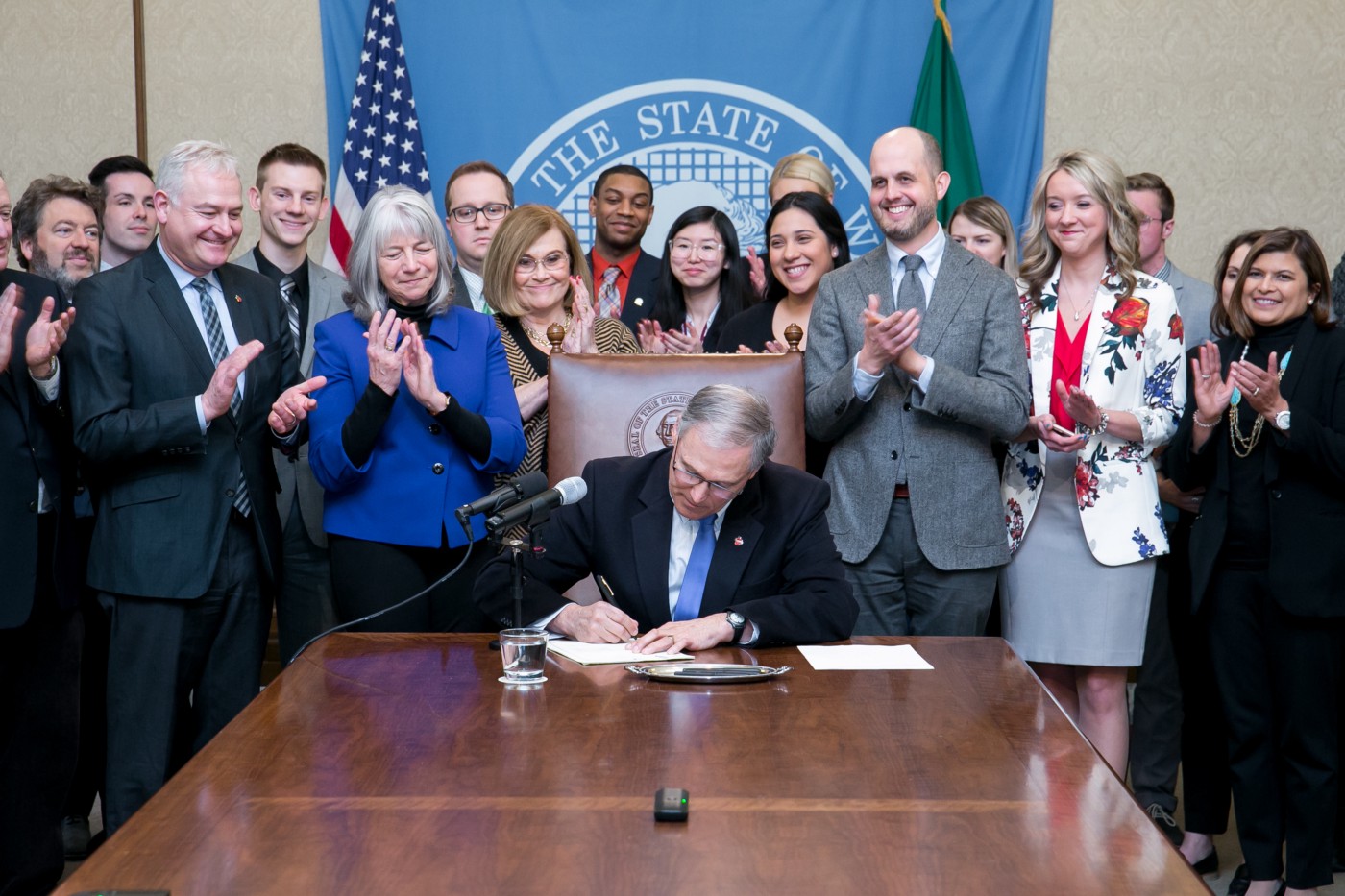Net neutrality will soon be the law of the land again — at least in the Evergreen State — following today’s signing of Substitute House Bill 2282 by Governor Jay Inslee, officially titled protecting an open internet in Washington State.
“Today we make history: Washington will be the first state in the nation to preserve the open internet,” Inslee said during today’s bill signing ceremony.
“We’ve seen the power of an open internet. It allows a student in Washington to connect with researchers all around the world — or a small business to compete in the global marketplace. It’s allowed the free flow of information and ideas in one of the greatest demonstrations of free speech in our history.”

The bill signing is attracting nationwide media coverage, from The New York Times to Time to CNET to Wired to ABC.
The legislation goes into effect June 6th (ninety days following session adjournment), and will restore some important protections that were outrageously gutted late last year by the Federal Communications Commission.
Here is a summary of the bill as provided by nonpartisan staff in the House.
Internet providers in Washington are prohibited, with some exceptions, from blocking content, applications, services, or nonharmful devices; impairing or degrading (“throttling”) traffic on the basis of content, application, service, or use of nonharmful devices; or favoring some traffic over others in exchange for benefit (“paid prioritization”).
Internet providers in Washington are required to disclose information about network management practices, pe performance, and commercial terms. A violation of the act is enforceable under the Consumer Protection Act, chapter 19.86 RCW, solely by the Attorney General. The Internet Consumer Access Account is created in the State Treasury.
Substitute House Bill 2282 passed the Legislature with overwhelming support earlier this session. Only five Republicans voted nay in the House, and only fourteen voted nay in the Senate. The House of Representatives had previously passed a similar bill in 2017, but it was not acted on by the Republican-controlled Senate.
Thanks to Manka Dhingra’s victory, net neutrality got a vote in both chambers this session and is now on our books as part of the Revised Code of Washington.
Republicans like Norma Smith can be proud of their role in ensuring that Substitute House Bill 2282 got lots of Republican support on its way to the governor’s desk. However, Smith is wrong when she says this is not a partisan issue.
Net neutrality is a partisan issue — in every respect.
We would still have net neutrality at the federal level if just one Republican had decided not to vote to repeal the FCC’s Open Internet Order from 2015.
But instead, all three Republicans (led by the corrupt and contemptible Ajit Pai), voted to rescind the protections that millions of Americans had emphatically and unequivocally told them to keep in place through grassroots lobbying.
The FCC’s two remaining Democratic members (Mignon Clyburn and Jessica Rosenworcel) were the only commissioners to listen to the people.
Pai’s party-line vote is now being challenged in court by multiple plaintiffs.
It is also worth noting that all issues are inherently partisan — that is what makes them issues to begin with. As we explained here a few weeks ago when we published a tongue-in-cheek banishment of that phrase:
BANISHED: NOT/SHOULDN’T BE A PARTISAN ISSUE
Heard frequently on the campaign trail. Newsflash to candidates, consultants, and elected officials: Every issue is a partisan issue. That’s what makes it an issue. An issue is commonly understood to be an important topic or problem for debate or discussion (Oxford Dictionaries), while is a partisan is anyone who strongly supports a particular cause. Anyone active in politics is by nature a partisan, not just those who belong to a political party and call themselves Democrats, Republicans, Libertarians, Greens, and so on. And all issues — even issues discussed and debated in supposedly “nonpartisan” environments — have partisan fissures.
That’s not a bad thing. Let’s stop pretending that some issues can or should be above partisanship… in a free country that prizes an open exchange of ideas in its politics, partisanship is to be expected.
Candidates, elected officials: Instead of saying x, y, or z shouldn’t be a partisan issue, simply say that you believe partisan disagreements needn’t be a barrier to bipartisan cooperation that allows us to make meaningful progress tackling an issue.
We look forward to the day when net neutrality is no longer an issue at all, but rather simply settled and accepted law that everyone agrees with.
Maybe that day will never come, but we can dream… and in the meantime, we’re very proud that Republicans in this Washington joined Democrats in saying yes to legislation that will safeguard our Internet freedom.
This new law is almost certain to face legal challenges from foes of Internet freedom. When Ajit Pai and his Republican cronies on the FCC rescinded the Open Internet order last year, they tried to prohibit states from passing their own net neutrality laws. That aspect of the Pai FCC order may now be litigated on multiple fronts.

Comcast and Verizon may soon be suing the people of Washington State as part of their campaign to destroy Internet freedom. Should they do so, we know Attorney General Bob Ferguson will mount a vigorous, unyielding defense in court.
If the federal government will not uphold our values, then states like Washington should and must step in to fill that vacuum. We at NPI are very, very proud that Washington is the first state in the country to pass its own net neutrality law. We are also very proud that Oregon is about to get a similar (albeit narrower) law.

